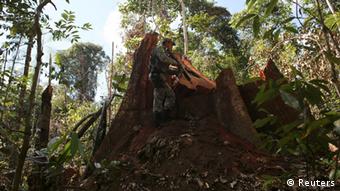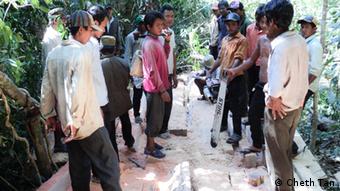Welcome
....to JusticeGhana Group

JusticeGhana is a Non-Governmental [and-not-for- profit] Organization (NGO) with a strong belief in Justice, Security and Progress....” More Details
Global Witness: 'Environmentalist murders escalating worldwide'
- Details
- Parent Category: Africa and The World
- Category: The World
- Created on Wednesday, 23 April 2014 00:00
- Hits: 5037
 Global Witness: 'Environmentalist murders escalating worldwide'
Global Witness: 'Environmentalist murders escalating worldwide'
There has been a sharp increase in violence against environmental activists around the world, according to a new report from Global Witness. Brazil and Cambodia are among the countries worst affected by the problem.
Competition for access to natural resources is intensifying as the global population grows and consumer waste forces up demand. This has placed enormous pressure on the world's forests and other natural areas. A battle has broken out between conservationists and corporations with competing interests.
Rights group Global Witness has been monitoring the violence and in a new report, they reveal that nearly a thousand people have been killed in the past decade. Oliver Courtney, a senior campaigner with Global Witness, discussed his findings with DW.
DW: Where are we seeing an increase in violence?
Oliver Courtney: This is a global problem. But Latin America and Asia Pacific are two regions particularly hard hit by this problem.
Why are people being attacked?
Ordinary people are coming into conflict when they oppose the sale or taking of their land for large scale natural resource projects. The key drivers are the expansion of industrial logging trade, land grabs by agribusiness and mining projects.
We are seeing deals being done behind closed doors. Large scale resource deals for land that belongs to local people or that people have lived on for generations. This land is being taken off them without their consent, without consulting them. When they object, they are forcibly ejected from their land – often with fatal consequences, as we are seeing here.
 One of the more shocking cases is from Brazil where prominent activists, Jose Claudio Ribeiro da Silva and his wife, were shot by masked gunmen in an ambush near the reserve where they'd been producing nuts and natural oils for the past 24 years. They had been protesting against the expansion of logging operations in the reserve where they lived and in the Amazon. Jose Claudio had one of his ears ripped off by the killers as proof of his execution.
One of the more shocking cases is from Brazil where prominent activists, Jose Claudio Ribeiro da Silva and his wife, were shot by masked gunmen in an ambush near the reserve where they'd been producing nuts and natural oils for the past 24 years. They had been protesting against the expansion of logging operations in the reserve where they lived and in the Amazon. Jose Claudio had one of his ears ripped off by the killers as proof of his execution.
Global Witness started researching this issue when Chuck Witty - a prominent Cambodian forest activist - was murdered in 2012 in Cambodia by military police. Shortly after his death a 14-year-old girl was killed in a forced eviction from a village in Cambodia, again by military police. This speaks to a history of the Cambodian government selling off the country's land, forest and other resources in deals behind closed doors to unscrupulous companies. People lose out, the environment loses out and a very small elite gain.
What kind of reaction is there from the police and the courts?
There is very little information available about perpetrators. Less than one percent of the killers in the 908 cases that we found have been brought to justice. It's terrible – it's particularly terrible for the families of the victims. It also has a knock-on effect in terms of silencing dissent and hampering environmental activism further.
These are people who we feel should be celebrated as heros and held up and supported by their governments. Instead, it appears they are not getting the protection they deserve. In some cases the governments are actively colluding with those responsible for the violence.
What impact does it have on a society and its natural resources when conservationists are killed or injured for speaking out?
These are the resources that belong to those people. It's very important that they are used in a sustainable way and that the people who live on the land and relied on it for generations have some say in how its managed. And if it is to be exploited, they should see some of the benefits.
 When they oppose such operations and they face violence or a fatal threat as a result, obviously that has a massively chilling effect on their efforts to protect the environment and it does hamper activism . It certainly means that the resource trade in general is one which serves the interests of a small minority – a powerful minority – rather than the greater good.
When they oppose such operations and they face violence or a fatal threat as a result, obviously that has a massively chilling effect on their efforts to protect the environment and it does hamper activism . It certainly means that the resource trade in general is one which serves the interests of a small minority – a powerful minority – rather than the greater good.
It's also not good for the planet as a whole that these resources are being sold off wholesale behind closed doors in deals which benefit a few and don't serve the interests of the wider planet.
This violence is being seen in developing nations and emerging economies. But in other reports, you've said the violence is spurred on by a spike in global consumption. So, really, the richest nations in the world are connected to this problem. Can you explain?
What is driving a lot of the competition for resources behind this rise in killings is consumption. Soaring, wasteful consumption of products like timber. Commodities like soya and rubber and other things which we use all the time in everyday products. The demand for that is increasing as populations grow, and countries develop further. It's simply not sustainable. We're stretching the planet beyond its limits and this is one of most obvious symptoms of that happening.
There really needs to be a rethink about how resources are used. How they're allocated on a national and international level.
 What are you hoping to achieve with the release of this report?
What are you hoping to achieve with the release of this report?
Environmental activists need to be protected and what is happening to them needs to be monitored. Not nearly enough attention is being paid to this problem. We want to see governments monitor the problem, protect their citizens, and make sure those responsible for environmental crimes are brought to justince. The UN human rights council should pass a resolution specifically addressing the plight of environmental and land defenders.
We also think companies have a role to play. They have to check their supply chain to make sure they have nothing to do with this violence. That they aren't operating in militarized areas and that they can be held accountable for how their purchasing policies are affecting everyday people. These acitivists, these people, are on the frontlines of the global land grab.
Courtney Oliver is a senior campaigner with Global Witness, which has just published the report 'Deadly Environment: The rise in killings of environmental and land defenders'.
Date 15.04.2014
Author Interview: Saroja Coelho
Editor André Leslie
Source: Deutsche Welle




